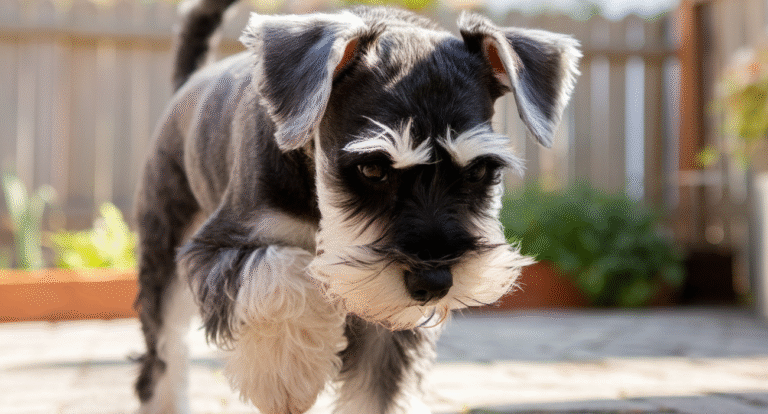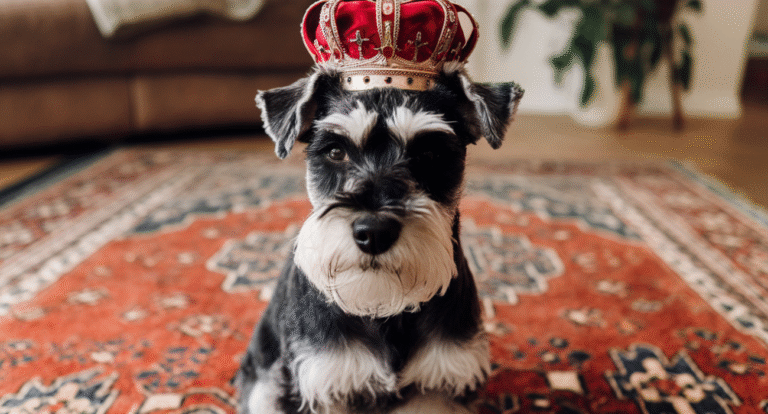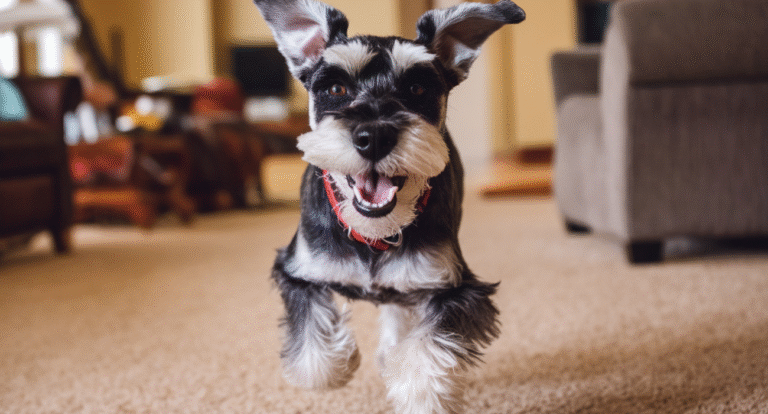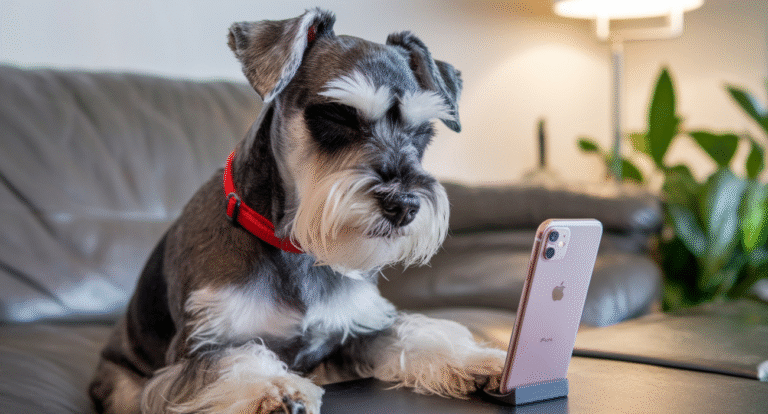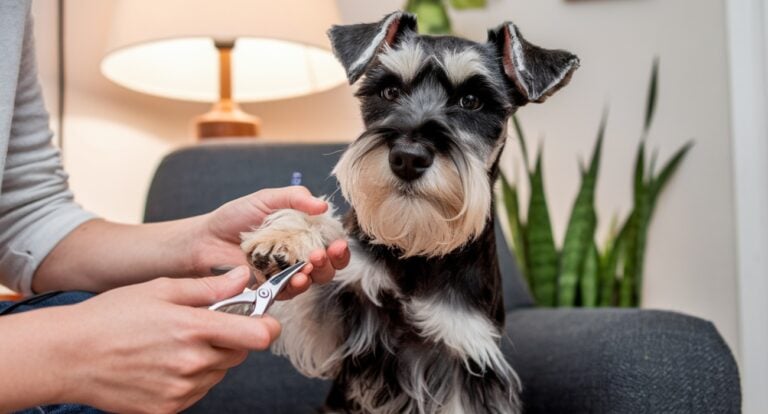Every Schnauzer owner faces common questions. Find the answers here to the things you’ve probably always wondered.
Living with a Schnauzer means accepting that you’ll never be the boss of your own home again. These dogs didn’t just steal your heart, they hijacked your couch, your routine, and probably your pillow too. But would you have it any other way? Absolutely not.
Every Schnauzer owner shares a special bond forged through shared experiences and mutual confusion. We’ve all stood in the pet store aisle, staring at grooming products like they’re written in ancient hieroglyphics. We’ve all wondered if our dog’s stubbornness is a feature or a bug. Spoiler alert: it’s definitely a feature.
Here are 10 questions just about every Schnauzer owner has had about their pup.
1. Why Is My Schnauzer So Stubborn?
Let’s address the elephant (or should we say Schnauzer?) in the room. Your dog isn’t stubborn; they’re just incredibly confident in their own decision-making abilities. Schnauzers were originally bred as farm dogs and ratters, which means they needed to think independently and make quick decisions without waiting for human approval.
This independent streak translates to modern life as what many owners lovingly call “selective hearing.” Your Schnauzer absolutely heard you call them. They simply evaluated your request, considered their options, and decided that continuing to sniff that fascinating spot on the ground was more important.
Training a Schnauzer isn’t about breaking their will; it’s about convincing them that your idea was actually their idea all along. Think of yourself less as a trainer and more as a very persuasive negotiator.
The key to working with this stubborn streak is consistency, positive reinforcement, and accepting that sometimes you’ll need to pick your battles. Make training fun and rewarding, and your Schnauzer will be much more likely to cooperate. Also, keeping training sessions short helps, because their attention span for things they don’t find interesting is roughly equivalent to a goldfish’s.
2. How Often Do I Really Need To Groom Them?
Welcome to the high-maintenance world of Schnauzer ownership! That gorgeous, wiry coat doesn’t maintain itself, and if you thought you could skip grooming, your Schnauzer’s increasingly shaggy appearance will quickly prove otherwise.
Professional grooming should happen every 5 to 8 weeks for most Schnauzers. This includes trimming, stripping (for show dogs), and shaping that iconic beard and eyebrows. Between professional visits, you’ll need to brush your Schnauzer at least 2 to 3 times per week to prevent matting and keep their coat looking sharp.
Here’s a helpful breakdown of Schnauzer grooming needs:
| Grooming Task | Frequency | Why It Matters |
|---|---|---|
| Professional grooming | Every 5-8 weeks | Maintains coat texture and shape |
| At-home brushing | 2-3 times per week | Prevents mats and tangles |
| Beard cleaning | Daily | Prevents food buildup and odor |
| Nail trimming | Every 3-4 weeks | Prevents discomfort and walking issues |
| Ear cleaning | Weekly | Reduces infection risk |
And let’s talk about that beard. That glorious, distinguished facial hair becomes a food magnet, water sponge, and general mess collector. Daily beard maintenance isn’t optional unless you enjoy the smell of fermented dog food wafting from your pup’s face.
3. Why Does My Schnauzer Bark At EVERYTHING?
Congratulations, you’ve adopted a furry alarm system that never sleeps and has exactly one volume setting: LOUD. Schnauzers were bred to be watchdogs, which means alerting their humans to potential threats is hardwired into their DNA. The problem? Your Schnauzer’s definition of “threat” includes leaves blowing past the window, the neighbor getting their mail, and that suspicious shadow that might be a burglar but is actually just the coat rack.
This vocal tendency is both a blessing and a curse. On one hand, you’ll never be surprised by a visitor or delivery person again. On the other hand, your neighbors might start giving you looks during your Schnauzer’s 6 AM announcement that a squirrel has dared to enter the yard.
The good news is that excessive barking can be managed (notice we said managed, not eliminated) through training. Teaching the “quiet” command, providing mental stimulation, and ensuring your Schnauzer gets enough exercise can all help reduce unnecessary barking. Some owners find that teaching their Schnauzer to bark on command actually helps, because it gives them control over when the barking starts and stops.
4. Are They Good With Kids And Other Pets?
The answer is a resounding “it depends,” which is probably not what you wanted to hear. Schnauzers can be fantastic with children, especially if they’re socialized from puppyhood. Their playful nature and medium size make them great playmates, and their protective instincts mean they’ll often appoint themselves as the children’s personal guardian.
However, Schnauzers don’t tolerate rough handling well, so very young children need supervision to ensure everyone plays nicely. These dogs have strong personalities and won’t hesitate to remove themselves from situations they find uncomfortable. Teaching children to respect the dog’s space and signals is crucial.
A well-socialized Schnauzer views their family as their pack, and that protective instinct extends to every member, whether they have two legs or four.
As for other pets, Schnauzers generally do well with other dogs, though their terrier heritage means they can be bossy and want to establish themselves as the leader. Their high prey drive can make them challenging with smaller pets like cats, rabbits, or hamsters, though many Schnauzers live peacefully with cats if raised together from puppyhood.
5. What’s With The Weird Sleeping Positions?
If your Schnauzer sleeps in bizarre, seemingly uncomfortable positions that make you question whether dogs have bones, you’re witnessing peak Schnauzer behavior. These dogs are Olympic-level contortionists who seem to actively seek out the most complicated sleeping arrangements possible.
From the classic “Superman” position (splayed out completely flat) to the mysterious “pretzel” configuration (how are those legs even bending that way?), Schnauzers embrace creative sleeping. The upside-down position with all four legs in the air is particularly popular and indicates your dog feels completely safe and comfortable in their environment.
Some scientists believe different sleeping positions help with temperature regulation, while others think dogs just sleep however feels comfortable in the moment. The truth is, your Schnauzer probably cycles through multiple positions throughout the night, potentially ending up in your spot on the bed by morning.
6. Why Is My Schnauzer So Food Obsessed?
Your Schnauzer isn’t just hungry; they’re strategically planning their next meal from the moment they finish their current one. This breed is notorious for their intense food motivation, which stems partly from their working dog heritage. Farm dogs needed healthy appetites to fuel their active lifestyles, and modern Schnauzers inherited this trait without inheriting the same level of daily physical labor.
This food obsession manifests in several ways. First, there’s the intense stare during your meals, where your Schnauzer perfects the art of looking simultaneously starving and betrayed. Second, there’s the sudden appearance in the kitchen the moment you even think about opening the refrigerator. They’ve somehow developed psychic abilities specifically related to food.
Portion control is critical for Schnauzers because their food motivation combined with their relatively low exercise needs (compared to their appetites) can lead to obesity. Overweight Schnauzers face increased health risks, including diabetes, joint problems, and heart disease. Resist those pleading eyes and stick to appropriate portion sizes and scheduled feeding times.
7. How Much Exercise Do They Actually Need?
Despite their terrier energy, Schnauzers don’t need marathon running sessions to stay happy. Most Schnauzers thrive with about 30 to 60 minutes of exercise per day, split into multiple sessions. This can include walks, playtime, training sessions, or interactive games that challenge their intelligent minds.
Mental stimulation is just as important as physical exercise for this smart breed. Puzzle toys, training new tricks, and nose work games can tire out a Schnauzer faster than a simple walk around the block. A bored Schnauzer becomes a destructive Schnauzer, so keeping their brain engaged is crucial.
The exercise needs vary somewhat by size. Miniature Schnauzers can burn energy effectively in smaller spaces and with shorter walks, while Standard Schnauzers need more substantial activity. Giant Schnauzers are the athletes of the family and require the most exercise to stay balanced and well-behaved.
8. Is It Normal For My Schnauzer To Follow Me Everywhere?
If you can’t use the bathroom without a furry chaperone, welcome to Schnauzer ownership! These dogs bond intensely with their families and often pick one person as their “special human.” Once chosen, you’ve gained a shadow who will follow you from room to room, including standing guard outside the bathroom door like a tiny, bearded Secret Service agent.
This behavior stems from their loyal, pack-oriented nature. Your Schnauzer doesn’t want to miss out on anything you’re doing, whether that’s loading the dishwasher, folding laundry, or simply moving to a different chair. In their mind, if you’re doing it, it must be important and potentially involve treats.
Living with a Schnauzer means accepting that privacy is a concept from your past life. Your new reality includes an audience for every activity and a warm presence during every Netflix binge.
This clinginess usually isn’t problematic unless it crosses into separation anxiety. If your Schnauzer becomes distressed when you leave or exhibits destructive behaviors during your absence, you may need to work on building their confidence and independence through gradual desensitization and creating positive associations with alone time.
9. Why Does My Schnauzer Have So Many Skin Issues?
Schnauzer skin can be sensitive, to put it mildly. This breed is prone to various skin conditions, including allergies, comedone syndrome (Schnauzer bumps), and general irritation. That beautiful coat comes with its share of maintenance challenges beyond just grooming.
Comedone syndrome is particularly common in Miniature Schnauzers. These blackhead-like bumps typically appear on the dog’s back and can become infected if not properly managed. Regular bathing with appropriate shampoos and keeping the coat clean can help minimize flare-ups.
Food allergies and environmental allergies also plague many Schnauzers. Symptoms include excessive scratching, paw licking, ear infections, and skin redness. Identifying the allergen often requires working closely with your veterinarian through elimination diets or allergy testing. Some owners find success with limited-ingredient diets, while others need prescription food or medication to manage symptoms.
Maintaining proper skin health involves regular grooming, using gentle dog-specific products, ensuring your Schnauzer isn’t bathed too frequently (which strips natural oils), and monitoring for any changes in their skin condition. When in doubt, consult your vet before the minor irritation becomes a major problem.
10. Are Schnauzers Really As Smart As People Say?
Yes, and that’s both wonderful and occasionally frustrating. Schnauzers consistently rank in the top tier of canine intelligence, which means they learn quickly, remember everything (especially grudges), and can outsmart their owners with alarming regularity.
This intelligence manifests in impressive ways. Schnauzers excel at problem-solving, can learn complex commands and tricks quickly, and often figure out cause and effect relationships that surprise their owners. They understand routines frighteningly well and will remind you if you’re running late for their walk or dinner.
However, intelligence in dogs doesn’t always mean obedience. Smart dogs often think for themselves, question commands, and find creative ways to get what they want. Your Schnauzer knows exactly what you’re asking them to do; they’re just weighing whether it’s worth their while to comply. This is why training needs to be engaging and rewarding, because Schnauzers quickly lose interest in repetitive exercises.
Their intelligence also means they need mental challenges to stay happy. Boredom leads to mischief, and a bored Schnauzer can be remarkably creative in finding ways to entertain themselves, often at the expense of your shoes, furniture, or sanity. Keep their minds active, and you’ll have a well-adjusted, happy companion who occasionally lets you think you’re in charge.


